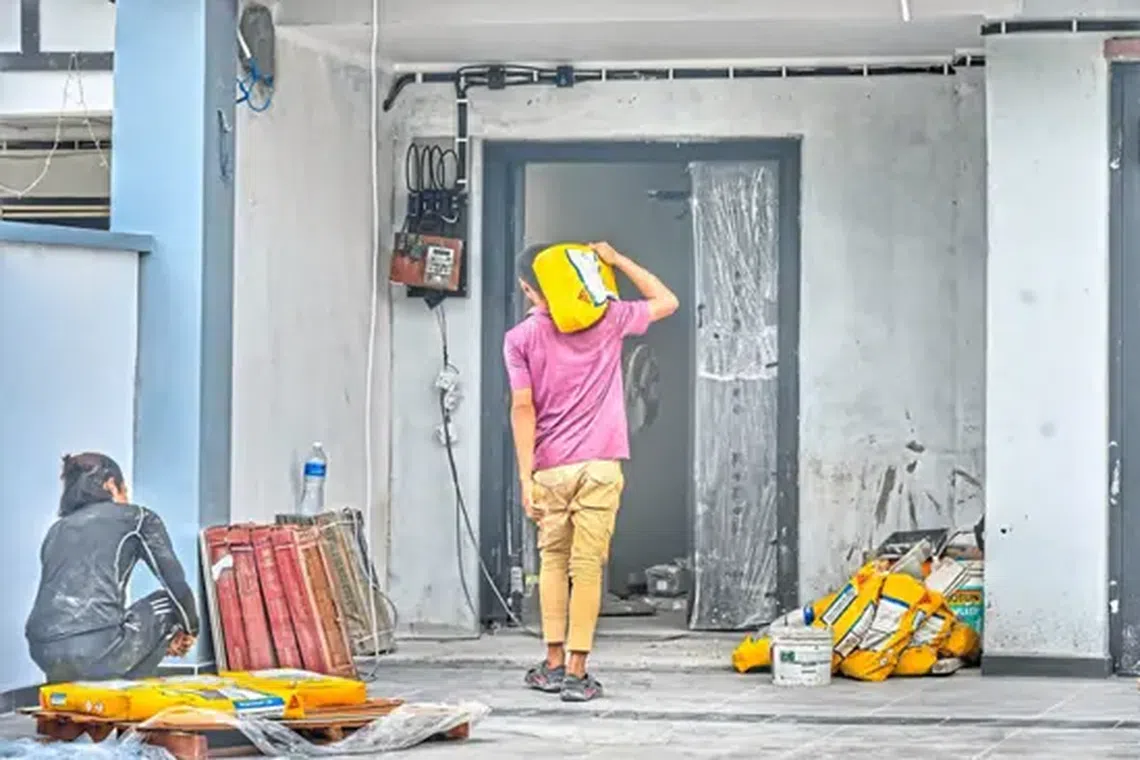前财政部长戴姆·扎努丁(Daim Zainuddin)表示,未当选的“全马来政府”对未来并不乐观。
问:国际货币基金组织(IMF)将当前的金融危机称为“重大封锁”。他们现在预计,今年全球经济将从之前的3.3%萎缩3%。速度和规模无与伦比。他们说,这与我们近几十年来所见过的任何金融危机都不一样,在金融危机中,问题的中心是非常具体的,即房价崩溃,金融泡沫破裂。这次,各地的每个行业都在崩溃。您是否同意,您将如何处理?
戴姆·扎努丁(Daim Zainuddin): Covid-19已迫使社会完全改变我们的日常规范,并将所有企业,政府和社区的所有弱点暴露出来。我们有机会停下来思考,重新评估自己的价值观,重新调整我们的价值观,不仅与人类同自然界的关系,而且重新思考我们生活中的优先事项。现在是我们有机会采取步骤改善我们的能力,并为更美好的未来而改变我们必须改变的东西。
1997-98年的亚洲金融危机是由不可持续的经济失衡引发的(股票和房地产投机性投资过多;非生产性消费和投资);以及货币和期限不匹配。 2008-09年全球金融危机–次级住房贷款,有毒资产,不可持续的借贷以及为消费和投资融资的过度杠杆化。这场危机是健康与经济危机之间的冲击之间更为复杂的相互联系,这些冲击打乱了我们通常的支出,做事和工作方式,并使之几乎完全停止。
Covid-19的影响是灾难性的。不仅是由于人员伤亡,而且还因为经济和企业的崩溃导致大量失业。历经数年建设的企业在短短几个月内就崩溃了,各个年龄段的人突然发现自己没有收入。我们还面临粮食短缺的威胁,并相应地担心无法负担基本需求。
经济和社会差距将进一步扩大,消除过去几十年来为缩小这些差距所取得的许多进步。最重要的是,我们仍然不确定我们是否能够恢复到“正常”状态,因为在五个月的时间里已经付出了很多工作和精力。
并非每个行业都受到负面影响。我们已经看到科技公司在这个时候蓬勃发展,那些对技术抱有信心的人看到了为他们服务的技术。
我们该如何处理?我觉得我们必须回到基础。我们必须假设需要重新从头开始重建事物。您如何为人们创造就业机会;以及如何为离职者提供再培训,以及什么样的再培训?这就引出了一个问题,即我们如何使我们的教育系统适应在线学习?这导致面对这个国家互联网连接差异的明显事实。
我们谈论粮食短缺;这是复兴农业,我们的食品生产行业的合适时机吗?也许这次我们可以做得更好,也许更多地使用技术和机器人技术。同样,这影响了我们的教育体系。我们是否需要从更基础的角度强调农业研究,并将其与机器人技术和AI的研究相结合?
显然,我无法详细回答我们如何应对这种经济形势。但是我可以说,我们需要回到构建基块并进行优先排序。我们如何使人们重返工作岗位?我们如何把钱放到人们的口袋里?我们如何保持最大雇主的中小企业?我们如何使食品更便宜,供应更可持续?
您已经处理了两个主要的金融危机。您从这两次经验中学到了什么?
政治和社会稳定,政策明确,强有力和明智的领导以及对法治的尊重非常重要。没有这四个要素,我们将度过艰难的时刻,而投资者将逃之.。投资者的信心至关重要。我们必须记住,该国约40%的投资是外国投资者提供的。现在是时候向他们求婚了。
我们知道日本和中国都将撤离中国。印度尼西亚和越南正在努力吸引外国公司迁往其国家。美国已决定在印尼投资。如果我们不认真,我们将被抛在后面。如果我们不谨慎的话,甚至本地投资者也会在其他国家投资。如果马来西亚不稳定,随着政策的转变,它们将走向其他地方。一个很好的例子是暂停汽车和住房贷款。这么多矛盾的陈述。
对于富人和穷人而言,法治似乎有所不同,您偷走一包米洛,最终将入狱,但如果您洗钱数十亿美元,便会走开一个自由人。
为了振兴经济,获得有关经济和商业状况的第一手信息很重要。在1998年危机期间,国家经济行动委员会(NEAC)每天开会,以监测和跟踪离地面更近的每日/每周信息和新闻流,并定期与各种行业协会/行业/经济部门进行接触。这是为了提供及时的政策对策,以减轻经济中断对家庭和企业的影响。
您必须有一个计划,并且必须有一个好的团队来执行该计划。您必须有短期,中期和长期目标。您必须知道如何执行实施,如何监视进度,如何根据不断变化的环境进行调整以及如何与民众进行沟通。
政府还必须记住,应对经济危机需要政府各部门的协调与合作,而不仅仅是财政部的责任。整个政府,所有部委以及州政府齐心协力,以确保该计划得到有效实施。如果政府的努力也集中在其他可能分散眼前经济形势的议程上,那么将很难集中精力振兴经济。
政府和中央银行正在竭尽全力通过刺激计划来限制关闭。但是有人认为刺激措施没有起到有效的作用。人们没有花太多钱,而企业却没有为经济运行提供应有的投资。您对我们实施的刺激计划有何看法?
全世界的政府已经推出了价值数万亿美元的财政支出计划,中央银行将利率下调至历史最低水平。在某些情况下大量注入,无限量注入流动性。美联储(Federal Reserve)已重新启动量化宽松(QE)。英格兰银行也是如此。
不可否认的事实是,与2008-09年全球金融危机相比,本轮降息的范围有限,因为利率已经处于较低水平,并且某些中央银行早已陷入负利率趋势,例如日本银行和欧洲中央银行(ECB)。尽管有量化宽松政策和负利率,日本和欧元区经济体仍未显示出令人信服的经济扩张,这暗示着人们担心货币刺激措施并未奏效。
财政和货币刺激措施的有效性取决于家庭和企业对这些方案的反应程度,信心的恢复以及对Covid-19收容措施的进展。
马来西亚的2,600亿令吉普里哈廷经济刺激计划以及350亿令吉的直接财政注资将减轻经济衰退的影响,并减轻对家庭和企业的影响(经济和金融痛苦),尽管该刺激计划的影响是短期的。
但是,马来西亚今年无法摆脱衰退。我们是一个贸易大国,如果主要经济体表现不佳,我们也不会表现良好。预计2020年全球经济将收缩3%,这是自1930年代大萧条以来最严重的衰退。

美国是世界上最大的经济体,已陷入衰退。它在第一季度的年化收缩率为4.8%,是自2008年以来的最高水平。到目前为止,截至2020年5月7日的最后七周,有3350万人申请了失业救济,这相当于失业率的下降。大约是大萧条时期的15.5%。仅在上周,四月份就有300万美国人申请失业救济,2,170万个工作岗位被削减。这是2008年全球金融危机期间最严重的月度跌幅的27倍,比第二次世界大战结束时1945年9月的前一次跌幅还要糟11倍。
中国也处于衰退之中。第一季度中国经济萎缩了近7%,是1992年以来的首次收缩。英国第一季度经济也萎缩了,这是自金融危机以来的最大跌幅。
马来西亚将不会幸免。政府预计今年经济将陷入衰退,GDP预计至少萎缩2%,尽管我自己的估计是经济增长将大大高于这一水平。从第一季度来看,除了服务业(3.1%)和制造业(1.5%)的小幅增长外,所有其他行业均出现负增长。我们必须记住,运动控制命令(MCO)只是在3月的最后两周才开始执行,但是大多数经济部门的表现都不佳。
由于许多公司努力维持生计,政府的财政状况将更加艰难,收入将大大减少。中小企业协会(SME Association)3月份进行的一项调查强调,近82%的中小企业预测2020财政年度将亏损,这意味着税收将大大降低。统计局的最新统计数据显示,在MCO期间,有68%的公司报告收入为零。
企业,特别是中小型企业的收入损失将转化为较高的失业率。这意味着需求将减少。因此,如果出口表现不佳,消费者群正在缩小,企业没有投资,那么增长将来自何处?那我们怎样才能收税来为支出和发展提供资金呢?
我非常担心失业。三月份的失业人数已经增加了17%,而且还会变得更糟。我们很快将有大约51,000名大学毕业生毕业,他们将很难找到工作。这不利于稳定性。我们还将看到贫困率也在上升。
该政策必须确保企业生存和工作受到保护。这是监视实施的重点。关于获得帮助的官僚程序,我收到了很多抱怨。
当我查看财政部(财政部)的最新报告时,很少有中小型企业获得帮助。尽管有6.31亿令吉的中小企业软贷款分配中的92.1%已使用,但它仅使14,075家中小企业受益。这仅是马来西亚907,065家中小型企业的1.55%。
工资补贴的受益者也很小。截至2020年5月17日,据报道,申请工资补贴计划的公司数量为267,752,约占马来西亚中小型企业总数的十分之三。
BSN和Tekun为微型企业提供的小额信贷的使用量同样很小。在7亿令吉中,只有35%得到了批准,只有15,641家微型企业获得了这项援助。这约占该国全部693,670家微型企业的2.3%。
交货缓慢,覆盖范围薄弱。这需要立即解决。一揽子刺激计划的有效性将取决于执行情况以及财务援助的利用方式。
政府是否为危机做好财务准备?总理表示,根据MCO,我们每天损失约24亿令吉。我们是否急于重新开放经济?难道政府没有能力在绝望的时期支持经济吗?
我们的财政空间或政府的资产负债表必须足够强大以应对危机。我们有一定的财政空间和债务借贷能力(占GDP的52%)采取反周期财政刺激措施。政府应该增加支出。
政府宣布了2600亿令吉的刺激计划,但实际的直接财政注资仅为350亿令吉,约占GDP的2%,太小了,无法产生有意义的影响。根据财政部的预测,财政赤字将从3.4%增至约4.7%,尽管随着GDP减少和借款增加,赤字将更高。
我坚决认为,政府可以承受更高的赤字,以挽救工作和公司。当经济复苏时,我们可以而且必须削减赤字。在80年代危机,98危机和2008危机期间,我们已经做了很多次。经济复苏后,我们设法减少了赤字。不要太教条,我们的重点是挽救人民。我们必须尽一切努力。
公平地说,我可以理解为什么政府渴望重新开放经济。我认为,利益相关者的争论点是如何进行的–他们的观点是,这很偶然,在详细的地图中也很缺乏。
没有时间表,每个人只有两天时间准备自己,标准操作程序(SOP)随部门而异。实际上,在PM宣布之后,许多SOP进行了进一步的更改和微调。许多非政府组织和商业机构本身都只有在宣布公告后才与他们进行磋商。
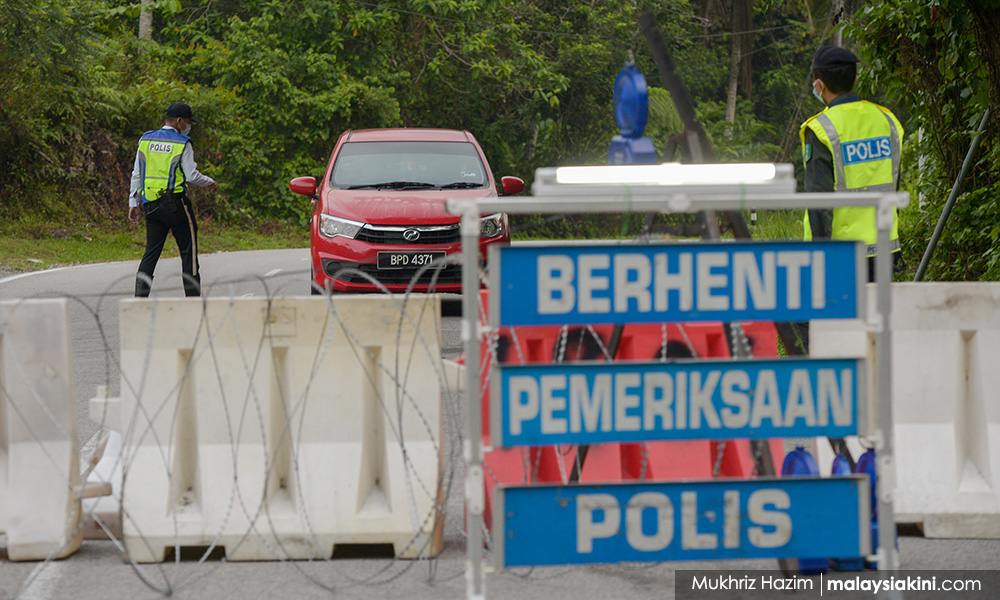
在解除限制的方式方面,还有很多事情需要完成。我们已经从一个警察到处都是,人们活动受到严格限制的严格级别,变成了似乎无所不包的状态。家庭可以一起逛街,人们可以随时从一个地区到另一个地区旅行。因此,令人怀疑的是,有条件的MCO是否有真实的地图或时间表。
关于政府是否无力在绝望的时期支持经济,您应该问的问题是“这个政府是否知道自己在做什么,是否有合适的人带领国家摆脱这场危机?
我们是否有足够的储备可以立即注入经济,还是政府需要筹集资金?
自1997/98年亚洲金融危机以来,政府已经连续23年出现财政赤字,这表明积累的储备(盈余或储蓄)不多。有一些可以动员的信托基金。国油可以通过提高石油所得税(PITA)和支付股息来做出贡献,但油价较低,这将具有挑战性。
让我们探讨和讨论向政府开放的一些选择:
a)对支出进行一些重新排序和重新排序。
b)通过列出GLC的资产,出售资产来增加收入(但时间安排对于GLIC至关重要,并且是GLIC的优先事项);私有化等
c)政府应修改我们的税收政策。商品及服务税(GST)的问题在于它的引入率很高,而人民无视其收益。我很久以前就提倡商品及服务税,但是引入的税率太高了,所收取的款项没有花在国民党上,也没有退还给公司,生活费用上升了。我们需要修改我们的税收政策,使其公正,高效和进步。
d)由于投资者对马来西亚债券的需求仍然旺盛,因此通过发行国内证券进行借贷。没有外汇风险敞口,鉴于当前低利率环境,借款成本很便宜。外部借贷(债务):根据1963年《外部贷款法》,外币债务被限制在350亿令吉(截至2020年3月的未偿债务估计为294亿令吉)。
e)审查政府对GDP的55%自行施加的行政限制。政府上次提高该比例是在2003年4月(GDP的40%)和2008年6月(GDP的45%)之间,到2009年7月进一步提高到GDP的55%。
f)政府可以向马来西亚国家银行借款。在《中央银行法》第X部分(与政府的关系)第71节中有此规定的范围。
这是不平凡的时期,需要不平凡的政策措施。我们不能只局限于正统和惯常思维。负责人必须在框外思考。
国际货币基金组织表示,已经有近100个国家向他们求助。马来西亚应该寻求国际帮助吗?有没有选择?
不,根据我们过去的个人经验以及根据我们对从国际货币基金组织借款的国家所遭受痛苦的见证,简单的答案是“否”。在1997-98年的亚洲金融危机期间,马来西亚通过其自身的非正统政策应对方式,包括不受欢迎的选择性资本管制和固定林吉特汇率,成功地使经济摆脱了严重的衰退(1998年GDP收缩7.4%)。无需向IMF的有条件贷款机构寻求财务援助。
政府仍然具有一定的财政政策能力,马来西亚国家银行拥有可用来减轻Covid-19所造成的经济影响的政策工具。
这场危机对穷人/弱势群体的影响更大,例如,日薪工人,个体经营者,经营餐馆的人在旅游业中的地位。我们已经看到大规模裁员和涉及SME的全面关闭,导致收入差距较低的人们的收入损失。为了防止不平等差距进一步扩大,需要采取哪些措施?
没有人能幸免于经济危机。当务之急是保护脆弱的家庭和团体以及企业,尤其是中小企业。对于企业而言,除了利用500亿令吉的Danajamin担保基金外,他们还可以通过企业债务重组委员会(CDRC)寻求可行的债务解决方案。
这场危机暴露了我们的社会安全网不足。我举一个例子。如果您是私人雇员并且为Socso缴费,那么一旦您失业,您就可以从雇员保险计划中获得收入。第一个月,您将获得上一次提薪的80%,并在第五个月和第六个月逐渐减少到最后一次提薪的30%。但是,如果您像马克西克·提马(Makcik Timah)或朴·阿里(Pak Ali)这样的自雇人士,您将没有任何保障。请记住,该国几乎一半的自雇人士已经失业。
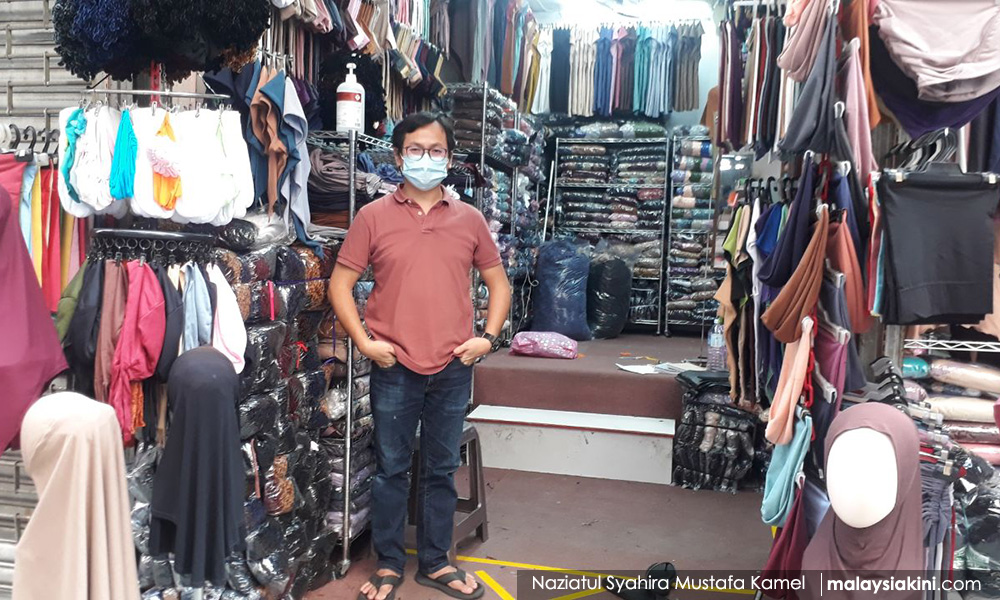
政府目前向企业提供工资补贴;同样的援助也应扩大到个体经营者。在Covid-19之后的恢复和恢复阶段,必须继续为弱势群体提供工作,技能培训和收入支持计划。可以提供某种形式的财政赠款和软贷款以支持微型企业家,包括电子商务和在线业务。
随着全球油价暴跌和新规范的出现,您认为在这个“新世界”中马来西亚经济的驱动力是什么?
创新,技术,数字化和生产力的提高是推动马来西亚增长催化剂前进的关键因素。其中包括使用更多数字和技术支持流程的核心电子和电气产品;电子商务的加速;基于知识的增值服务;内容创作;电子支付网关;金融科技解决方案;智慧农业;医疗设备和医疗保健,食品加工和清真产品,可持续产品(生态绿色,有机,可持续采购和供应商);生物技术数据解决方案;和纳米技术等
在投资用于高科技,数字化和可持续目的(可再生能源,气候变化,生态绿色)的“新智能基础设施”方面,迫切需要激励措施和政策,包括明确的战略和路线图。其中包括大数据中心,5G基础设施以及新能源汽车(NEV),太阳能,医疗保健等的充电站。
Covid-19大流行表明,数字化和技术可以使韩国,台湾等国家迅速应对危机,并最大程度地减少对企业的破坏。随着我们的前进,创新和新经济可能是马来西亚发展的关键领域,也是经济价值的重要创造者。
的确,即使在Covid-19爆发之前,创新和新经济仍被认为是马来西亚的主要增长催化剂。随着我们摆脱危机,我们需要加倍努力并加快努力,以确保我们能够在激烈的竞争环境中顽强竞争。这种大流行还加剧了在供应链甚至以服务为中心的地区制定备份计划和替代来源的需求。
石油价格将随着时间恢复。也许没有达到我们以前喜欢的水平,但它们会恢复。这里重要的是提高我们生产过程的效率。我们不能以同样的方式做事。如果您意识到这一点,今天许多传统产业仍然非常重要,例如农业和农业。例如,对于建筑和制造也可以这样说。
但是至关重要的是如何通过使用机器人技术和人工智能来提高效率和产量。因此,不是因为无法完成这些年来一直在做的事情,而是更多关于如何改进我们做这些事情的方式。
当我们谈论当前情况时,有很多词语被用来塑造今天的叙事。用“前所未有的”和“新规范”之类的词来形容我们所处的状况。用您自己的话说,您将如何描述我们目前正在经历的事情?
我们在许多国家/地区都听到过“空前”和“新规范”这两个词。这真的是史无前例的吗?这是新东西吗?以前没有发生过吗?事实和知识至关重要。
我喜欢受过教育。我会请历史学家而不是经济学家来教育我。我是历史学的学生。我们将被告知这不是第一次,因此我们将进行更深入的研究并了解当时的处理方式。上一次全球大流行是1918年的西班牙流感,马来亚也未能幸免。它如何成为全球性的?阅读和教育非常有趣。我们从过去的经验中学到东西;例如,与圣路易斯或旧金山相比,费城如何处理西班牙流感,其后果是什么?与现在相比,美国当时如何应对西班牙的大流行?
请记住当时的情况与现在不同。世界在所有部门,特别是科学技术领域都取得了进步,但许多国家对当前的大流行反应迟钝。我们了解到巴厘岛,喀拉拉邦和越南如何成功应对这一大流行。然而,许多政府未能保护其公民的生命。每个人都有自己的风格和应对危机的方式,因此我们拭目以待到目前为止所实施政策的结果。
这是一次“黑天鹅”事件-全球性健康大流行,已爆发为一场经济危机,并迫使全球范围内的国家采取行动遏制疫情。在Covid-19大流行之前,中美贸易紧张已经给全球经济带来压力。根据国际金融研究所(IIF)的数据,2019年全球债务达到255万亿美元的历史新高,超过GDP的322%。许多国家的债务水平很高。在发达国家,利率几乎接近零。我们以很少的弹药(包括财政和货币弹药)进入大流行病。
与1930年代的大萧条相比,经济和金融损失的可扩展性影响更深。
Covid-19后的新正常道路最终将变为“正常”,因为人们和企业在我们的日常工作中都将社会隔离作为一种社会规范。远程办公室和界面以及虚拟社交网络将在商业世界中被普遍采用。随着5G无线技术的出现,非接触式商务平台将得到加速和快速发展。将会发生逆向全球化,企业将试图将供应链限制在少数几个前哨基地。尽管与全球流行病的斗争可能艰巨,旷日持久且代价高昂,但它可以为未来的大规模变革机遇铺平道路。
您对加密货币有何看法?您是否认为这也会成为Covid-19后经济的主要力量/货币?
过去几年中,加密货币的迅猛增长促使130个国家/地区的更多国家和地区当局努力应对其监管。政府应该监管而不是完全禁止加密货币,因为它会扼杀数字创新。
中央银行提出的最普遍的挑战之一是,如何教育消费者和投资者关于中央银行发行和担保的实际货币与没有加密货币之间的差异。由于不受监管,与加密货币相关的高波动性导致交易和投资风险。此外,加密货币还为洗钱和恐怖主义等非法活动创造了机会。
有认真的思想认为,中央银行应该是承认任何新兴货币形式的最终当局。如果有什么东西可以代替法定货币,它就需要获得中央银行的支持,甚至需要由中央银行发行的数字货币。目前,至少有18家中央银行正在开发数字货币,但它们是独立进行的。对抗私有数字货币的最有效方法是通过协作方法来管理货币和金融稳定性以及外汇管制。
几家机构预测,加密货币将在Covid-19后经济中发挥更大的作用。德意志银行预测,由于许多政府将现金处理视为潜在的风险因素,因此这种流行病将极大地加快数字支付系统(如加密货币)的采用。这可能会增加向数字现金过渡的电话。牛津大学的研究人员最近表示,面对全球金融危机,加密比以往任何时候都变得越来越重要。
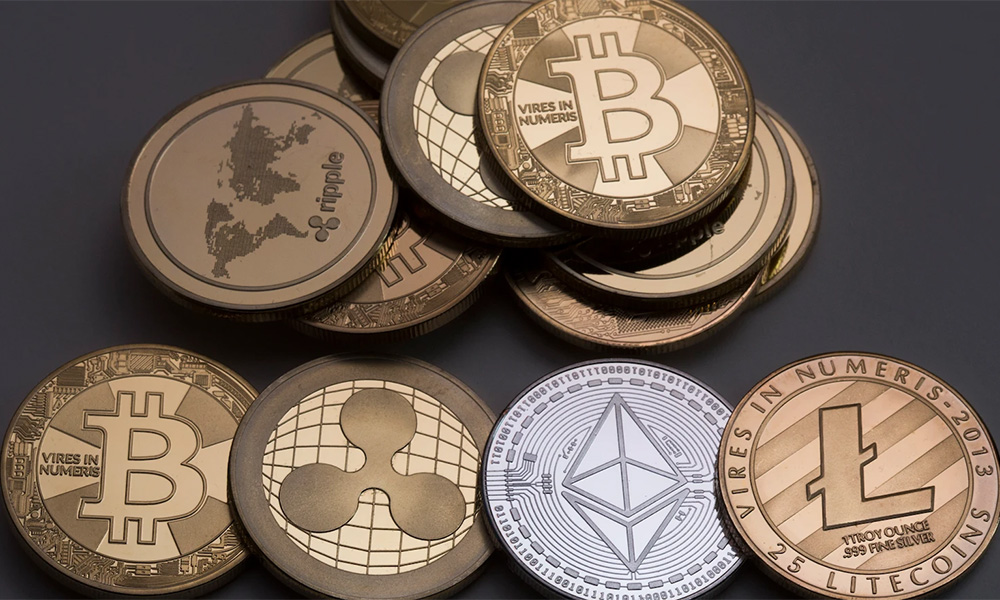
但是,许多人仍将加密货币视为谜。许多人都熟悉诸如“比特币”,“加密”和“区块链”之类的术语,但很少有人知道它们的确切含义。对加密货币的基本了解可能对在Covid-19后经济中取得成功至关重要。加密货币市场仍然非常动荡,但它将继续增长和成熟,尤其是随着许多中央银行以非常认真的方式关注中央银行发行数字货币(CBDC)计划的情况。
由于Covid-19带来了如此多的不确定性,我预计大多数投资者和实体将专注于更成熟,更成熟的事物,同时专注于创新的必要领域,以使其处于更稳定的基础上–增长或投资。仍然相对未知的加密货币并没有给我留下深刻的印象,因为它将在Covid-19之后立即流行起来。它将像Covid-19之前一样进一步发展。
您对航空业有何看法?您之前曾反对KL-新加坡高铁(HSR),因为您说这会扼杀航空公司的业务。这是否意味着您比航空业对航空业的支持更多,为什么?
航空业是这一流行病中受灾最严重的部门,很可能会成为与旅游业一起复苏的最后一个部门。由于Covid-19的迅速普及,全球商业航空公司和其他航空业务在未来几个月内将面临前所未有的巨大财务压力,甚至可能破产,这是由于Covid-19的迅速普及迫使他们裁员数千名员工并采取大幅减薪措施。
各国政府已开始为航空业提供救援方案,以防止航空业遭受灾难性破坏。但是我们必须小心,确保人们可以从A点前往B点并为所有者提供救助是有区别的。现在不是拯救亿万富翁的时候。我们不能使损失社会化,而不能使利润私有化。
在高铁方面,我相信即使在像马来西亚这样的小国中,这两种运输系统也存在共存甚至互补的空间。
我对吉隆坡-新加坡高铁表示保留,因为我觉得政府签署的协议是不平衡的,不利于马来西亚的利益。例如,这将使新加坡能够就该线路在马来西亚的使用方式发表联合发言权。我认为这是不对的,我仍然认为这样的条款会影响国家的主权。
马来西亚将失去对轨道工程,信号和控制系统的“主权所有权”,并且她也不拥有对列车服务和位于马来西亚境内的轨道使用时间表的全部权利。这意味着高铁轨道和系统在国内的任何使用,例如与马来西亚在该国可用的其他铁路网络的互操作性,都必须事先获得新加坡的批准。
在当今时代,火车服务跨界运行是很普遍的,而这已经通过通用的互操作性标准和法规得以实现。各国不仅建立和拥有基础设施,轨道和系统,而且还拥有完全控制权,以规范其主权领土内轨道和火车服务的使用。有了这种控制,各国就可以最大程度地利用其领土内的铁轨,从而与现有和未来的国内和/或国际铁路网络实现互联互通。
马来西亚拥有680公里的东海岸铁路线(ECRL),并有潜力将其与高铁和现有的ERL线路连接和集成,因此马来西亚有机会“即时”开发1,070条国内高速铁路网。 This high-speed rail network can be further expanded northwards to the Malaysia-Thailand border, thus forming a National Domestic High-speed Network: North-South and East-West for Peninsular Malaysia. This will also lead to the realisation of the Trans-Asia Railway Network in the near future.
Ceding control for the usage of our HSR track to Singapore would put this vision in jeopardy of being derailed. In addition, sovereignty should always be the top priority in safeguarding our national interests.
You have spoken against the idea of a Perikatan Nasional (PN) coalition. Does it still stand? What are your thoughts on Umno and PAS? Bersatu reconciliation?
My principle has not changed, it is a question of legitimacy. The parties concerned can set up whatever coalition they want, but to do it in order to form a new government is not in line with the will of the rakyat. We need to respect the mandate of the people. In 2018, the rakyat voted in a Pakatan Harapan government to rule for five years until a new general election is called. That needs to be respected. The formation of a Perikatan Nasional government did not respect that mandate.
Another is the issue of a totally Malay government. Yes, the PN government can say they have included GPS and MIC and MCA, but as far as far as MCA and MIC are concerned, they are very much token appointments, simply because these two non-Malay parties had such an insignificant number of parliamentary seats. And while MCA has proceeded to appoint several of its officials to GLC positions, these have no say in the running of the government. So, who is representing the non-Malay communities in the government?
Representation must not be token.
Umno and PAS seem to have forged a pretty tight partnership. But it is still early days as in we are still three years from the next GE. Come GE15, will they still be so close when each will be competing for seats in the Malay areas?
I do not know whether Bersatu reconciliation is on the cards. It is up to the members to decide.
The PN coalition of Umno, PAS and Bersatu are all Malay-based parties and will compete for the same Malay seats. I am not sure how three competing coalition members will be able to satisfy their members on the ground. Will these push and pull from the ground destabilise the government machinery and interrupt the multi-ministerial initiatives planned for the people? If they cannot work as a team, how can the government’s plans to rehabilitate the economy and uplift the people’s lives be effective?
Do you think Dr Mahathir Mohamad made a mistake by stepping down as PM?
You have to listen to his reasons. He has stated very clearly in his FB video that he was left with little choice but to resign as PM and Bersatu chairperson because at that point of time, Bersatu had rejected him and refused to follow his advice and plea to stay with Harapan. It was only after this fact, that some within Bersatu appealed to him to withdraw his resignation. He was talking about principles, but by then the die was cast.
It really isn’t so simple as whether or not he made a mistake. You need to understand what was happening at that time. It was not as if he could have taken time to consider all avenues. He had to make a decision quickly. Now after the fact, it is easy to say mistake, no mistake. But at that time and under those circumstances, was it a mistake?
There have been a lot of new appointments made at GLCs/GLICs. It is not out of norm but should we be worried that politicians are coming in and technocrats are pushed out? Will we see a return of old norms of rewarding contracts to grassroot leaders to sustain political activities?
It may not be out of the norm to have some political appointees at GLCs and GLICs but it is certainly out of the norm to have so many political appointments.
People see this as being done very blatantly with the sole intention of buying political support. We have a truly bloated cabinet of more than 70 people including those appointed as special ambassadors with ministerial ranks. And at the latest count there were 13 political appointees as chairmen of various government companies and bodies. These do not include those appointed to BoDs (board of directors).
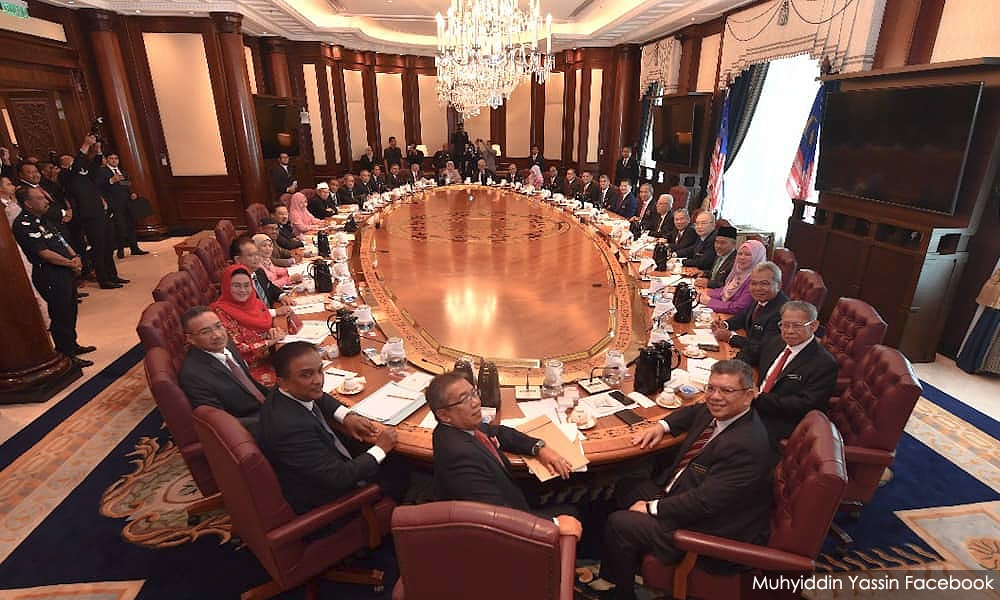
The main issues here are whether these appointees have the background and qualification to be leading these bodies, and secondly whether they are able to divide their time and yet commit themselves fully to the tasks they have been given? People also question why the government is intent on enriching the MPs?
Why is this government putting so much wealth and power into the hands of a privileged, unqualified few? Why must the cake be made smaller? Why are the many talented people this country has produced being ignored? Why are the commitment and capabilities of so many professionals who could have done a much better job being insulted? The media should ask the government these questions.
If the government wants to help the MPs and retain their loyalty and support, there are many ways of doing it without inviting criticism and definitely not at the expense of the well being of the GLCs and GLICs.
You were also the PM’s special envoy to China. Would you say you have completed your mission? Was there a list of things that had to be negotiated with the Chinese apart from ECRL (i.e. pipelines, ports, South China Sea, Jho Low)? What is your advice on how we should deal with China?
Well, I was negotiating the gas pipeline project but then the change in government happened. I have written to the PM as he may have other candidates to take over.
The PN government has appointed a special envoy to China, so he should be able to advise them accordingly as to how they should deal with China.
There were many reforms that the Harapan government tried to push for. One of them is political funding. Would you agree that one of the causes of the 1MDB scandal is because we failed to establish a good political funding system? What is the most ideal political funding system that we can have here that is practical?
I think the main cause of the 1MDB scandal were greed and lack of integrity, honesty, good governance; and the self-preservation by those who were in a position to check and question. Those in a position of responsibility must have principles. How much of the funds that were siphoned out were actually used for the general election or for political purposes as compared to the amount that was spent on luxury homes, yachts, artwork, jewellery, etc?
And don’t forget that the initial amount was never deposited into any party account as would be the case if it was for political funding. 1MDB was a slush fund for the personal use of the individual and along the way, he also utilised some of it for political purposes.
But then the fact that relatively large sums were also given to various BN members and divisions points to the weaknesses or even the absence of any regulations to political funding. As you know, Bersih has come up with a model for political financing. They have suggested setting limits to annual contributions, making transparent the identity of donors and how much they donate and a total ban on any type of slush funds. Others have also suggested a total ban on any form of foreign political funding.
Given the close nexus between businesses and political parties, it is understandable that there needs to be some transparency in the political funding process. But we must find a system that is suitable and particular to this country. Have we found it yet? We must start somewhere.
How important is Parliament in the process of reform and what does a one-day sitting mean to this reform process?
We are talking about principles here. When we want to discuss our Westminster style of Parliament then we must go back to where it started. Learn the history of Parliament. Who controlled it at early stages? Members were not paid. Who were the voters? Then many reforms were instituted and why these reforms? The end result was a constitutional monarchy and parliamentary democracy.
l think for us but especially the young, it is best to revisit the King’s speech to Parliament in 1959 which in my view was a very good one.
Democracy as we understand it is a government by the people for the people. People choose the govt for good or bad. lt is their choice and they must live with their choice at least for the next five years until the next election is called.
Even the PM recently admitted that this is not a government chosen by people. People elect their MPs and therefore their government so we must respect their choice and must not betray them. Their wishes must prevail. Any government of the day must be sensitive to the voice and wishes of the rakyat as the government will have to go back to the rakyat to ask for the next mandate.
Parliament has its standing orders, rules procedures, conventions and Speaker is independent. Democracy and Parliament go together hence parliamentary democracy as practised here in Malaysia. By limiting Parliament to a one-day sitting, what the PN government did was unprecedented in our history. It is silencing the voice of Parliament and really riding roughshod over the standing of Parliament in a democratic country. And if you reduce and ignore the role of MPs to be just rubber-stampers or merely as onlookers then you are ignoring the voice of the people.
The MPs in Parliament represents the voice and will of the people, the rakyat. In Parliament MPs speak and they speak as representatives of the people. It is undemocratic to silence them. What you are really doing is telling the rakyat that their opinions do not matter, that their choice does not matter, that their voice does not matter and ultimately their votes do not matter.
As you know, the Harapan government was in the process of carrying several major institutional and parliamentary reforms. The Institutional Reform Committee under the CEP had recommended a long list of reforms and submitted this to the PM at the time. Unfortunately, many were placed on the backburner, some were killed even before they got off the ground, and others were in the process of being carried out when Harapan lost its hold on the government.
Even then the Harapan government did manage some important reforms such as the move to lower the voting age to 18 years, appointing an opposition MP to head the PAC and setting up a Special Select Committee to give Parliament and MPs greater oversight over government decisions.
These were the easier reforms to carry out because they did not require amendments to the Constitution. It is when reforms require such amendments that Parliament becomes imperative. So here we are talking about things like limiting the number of terms for the PM and even regulating political funding.
You’ve spoken about how the New Economic Policy (NEP) should evolve into a needs-based policy as opposed to race-based. Do you see that happening?
In order for this to happen, we need political stability which will create the political will which will then allow for a comprehensive plan to be drafted and initiated by the government. However recent events have shown that this will not happen any time soon since there is no working consensus among the parties in the present government.
What was your vision for the agriculture sector? Everywhere you’d go you would talk about agriculture and there was a lot going on as well with Felda restructuring their land plots, FGV venturing into farming and durian planting, collaborations with telcos to bring 5G into agriculture. What was the plan there?
My vision is to see the Malaysian agriculture sector to develop into a great equaliser – to give fair compensation to farmers and fishermen, and to bring greater development to rural areas. As you said, I spoke a great deal about agriculture, particularly modern precise agriculture, because this is the key to increasing income for our farmers. Modern agriculture techniques allow us to make the most of our resources, increasing output and reducing waste, labour, and environmental impact.
With the larger corporate groups venturing into farming, this was to accomplish another goal of developing the Malaysian agriculture sector, which is to achieve a higher level of self-sufficiency. In Malaysia, we rely heavily on imported goods. When we do have local goods, there is a disproportionate profit taken up by middlemen who often control storage and logistics. Both these factors contribute to the higher cost of goods borne by the end consumer, the higher cost of living that burdens the rakyat.
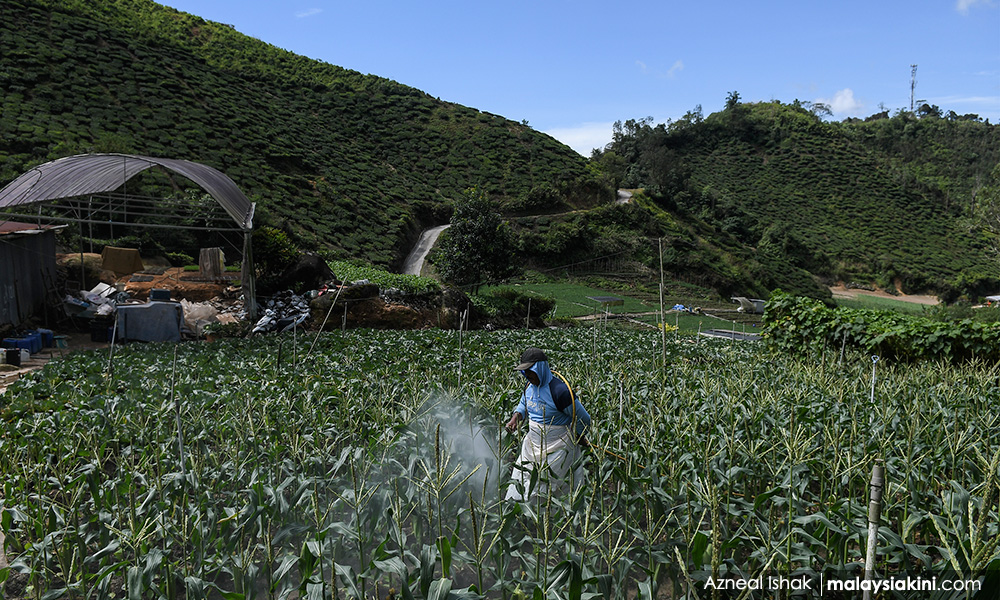
Unlike smallholder farmers, larger groups like Felda and Felcra have access to large plots of land and have the capital to invest in modern farming technology. These high initial costs are what often hold smallholder farmers back from being able to take the leap from traditional farming to modern farming.
Once modern techniques become more common in Malaysia, and the ecosystem develops, the hope is that more local companies take note and increase local production of the various cogs that make up the agricultural machine. For instance, we have local drone companies, but not enough to bring the costs down sufficiently to cater to smallholders. Much of our animal feed and vegetable fertiliser is imported, which adds to costs and our vulnerability to currency changes.
I hope that the large companies that were planning to invest in agriculture will follow through on their plans, as people will always need to eat, and Malaysia is far behind in achieving a self-sufficient and sustainable agriculture sector. Since the MCO started, the weaknesses throughout the agricultural supply chain have been laid bare.
Those in charge must have a clear grasp of the supply chain if the dream of a modern agriculture sector is to come true in Malaysia. They must continue to encourage investment in the agriculture industry, enhance training for graduates who wish to pursue a career in agriculture or aquaculture, and provide the necessary support to remove the barriers to entry for budding new farmers.
Were there targets that were set out for the agriculture sector? Maybe reducing our food import cost or cutting our reliance on palm oil? Do you think what you did will continue? Should there be an urgency to do it?
When I speak of the agriculture sector, I always reaffirm that the goal is to increase output, increase income for the farmers, and to reduce the food import bill. This, in turn, will reduce the cost of consumer products, as well as strengthen the ringgit. Rather than cutting out palm oil, the target should be to diversify the agricultural industry to improve food production and reduce monocropping, which is both risky to the farmer as well as bad for the environment.
As to whether or not it will continue, in my opinion, we have no choice but to continue this pursuit. The current model of relying on imports is not sustainable. Subsidising farmers and fishermen indefinitely is not sustainable. What is needed is targeted investments to improve their livelihoods, and give them a long-term increase in income which is reflective of the importance of their work. By investing in modern agriculture, we are investing in our future – ecologically friendly technological to reduce environmental impact, modern techniques which reduce labour and resource costs.
During this MCO period, we started to hear more and more of the term “essential worker”. What is more essential to our community that the ability to feed ourselves? We have heard many stories of everyday Malaysians becoming MCO farmers, starting to grow their own crops during this time. I highly commend those that have been able to do so, and hope that we all continue to cultivate home farms even after the restrictions are lifted. However, I hope that all of you who have started home farming now realise the time and effort that goes into producing food.
Is it fair that essential workers, including those that produce our food, are often the least paid, the ones living in uncertainty, depending on daily wages to survive? No. This must change, and it must change now.
Now more than ever, there must a great sense of urgency to pursue food self-sufficiency in Malaysia. After the MCO is lifted, we will be contending with the economic repercussions of Covid-19. One such repercussion is the widening of the income gap and worsening inequality. The B40, of which many are farmers and fishermen, will be the worst hit.
Both the government and the private sector will need to play their roles in mitigating this impending crisis, and ensuring that all Malaysians are able to put food on their plates. By this, I mean that not only must all Malaysians be able to earn a consistent living, but also that there is no risk of food shortages in Malaysia. The best time to start was yesterday, the second-best time to start is now.
THE DAIM ‘INTERVIEW’
Mahathir needed to act fast, says Daim on PM resignation
Daim: Why is GLC wealth, power placed in hands of ‘unqualified’ few?
Protect jobs and think outside the box, Daim tells gov’t amid economic downturn
DAIM ZAINUDDIN is a former finance minister and former chairperson of the Council of Eminent Persons. He has retired from politics and business and currently attends to his small farm.
[[Editor’s note: The above interview was prepared beforehand by the interviewee and sent in this format to several media organisations.]The views expressed here are those of the author/contributor and do not necessarily represent the views of Malaysiakini.
阅读更多




